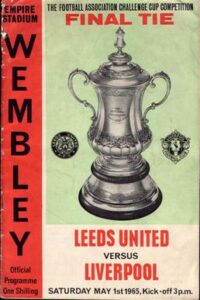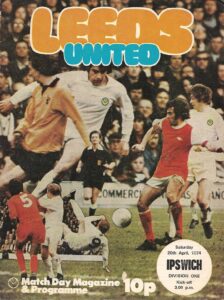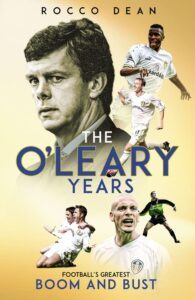 Leeds United broke my heart.
Leeds United broke my heart.
I had been to my first game at the tender age of 8. We played Leicester City in the Texaco Cup. The legendary Peter Shilton was in goals for the visitors. But my eyes were on our goalmouth. I was transfixed by our keeper.
I started thereafter to go to games. It was different times, and nobody took me. I just went. I have no idea how many times I saw our keeper play but then, from October 1973, he was no longer there. Dave Stewart had played his last for Ayr United and signed for some other team. I was heartbroken.
Leeds United had stolen my idol.
Clearly, I recovered and went back but the personal stain and the joy of following a team, of any team lies at the heart of Rocco Dean’s The O’Leary Years. Here we are taken on a very personal journey from the emergence of a club living in the shadow of the legendary period – Don Revie – and the culture shock of disrespect – the Clough days – the misstep of a Scottish legend – Jock Stein’s tenure – and the cliché of being another “sleeping giant” to a promising land close to a title and a European Odyssey of achievement.
I think almost all of us have an opinion of Leeds United and in Scotland, especially, our view is littered with names from the past which make the emotions stir when we hear them. To read a fan’s account of a time when it looked like they had found a Messiah, had uncovered opportunities, here and in Europe and how these rollercoasters felt from a terrace, from their Kop is fascinating as a start.
But it needs to deliver.
Dean does. We begin with George Graham. Here is yet another Scot, not naturally associated with Leeds, but who has grit and determination writ large and who seemed to suit the doggedness of Leeds. But like many deluded Celts, he saw the bright lights of London town as a brighter prospect than giving a team with prospects their chance. What makes it a better read is having his mercenary ship jumping juxtaposed with the stories of camaraderie in queues for away game tickets that followed his treachery. Away games are different. The away fan may not be a completely different breed to the home fan, but they have a different perspective. Here Dean really shines as his ground hopping are drawn with a fan’s love of the game. Different grounds are to be treasured, not just for the away wins, but the respect to those supporters whose homes they are. But also Dean draws comparisons against his own matchday home experiences.
As Graham’s tenure comes to an end, we hear of the Academy graduates who should be ready for slowing bleeding into the first team. The future as created and prepared by the legendary Howard Wilkinson. One of Graham’s protegees, David O’Leary steps forward to take temporary charge of the First Team. Devastated by his leaving George Graham successor needed to bring something to the terraces. Dean took to him, like the Elland Road faithful, readily and heartily. He was instantly bringing excitement onto the pitch which was felt throughout the terracing. As a young man, Dean grew with his team and the progress of the club is excitingly told as O’Leary went from not wanting the job, through an Elland Road epiphany where they sang his name, to making the job, his own.
For those of us from afar, O’Leary became, not another tracksuit manager, but the manager who had a coat that looked like a duvet! We thought Leeds must have been constantly bitterly cold…
The warmth from terrace to dugout was to keep things ticking along as Europe was now a thing, and the faithful wanted it to be a big thing. The UEFA cup, the Champion’s League and progress in each was emerging as an expectation. Such expectations needed more than Academy graduates. It needed funded and Leeds began to spend.
Perhaps here the parallels with Glasgow Rangers began to emerge for me. As I read, I could hear the faith put in people who “knew” business. They had spending, the likes of which fans could not contemplate but were content that they were competing with other bigger clubs in a transfer market that was becoming a basket case. Ordinary, run of the mill, decent professionals were commanding finance even their mobile numbers were dwarfed by. It brought limited success and a gloomy horizon.
Telling the story, Dean’s structure takes each season from 1998/99 to 2001/02 and describes them in some detail with significant matches as subheadings. At times I found that some of the summaries of games in between each of these significant fixtures a little less than satisfying as there were games I wanted to know more about – the equalling of Don Revie’s 7 wins in a row for example. But then the detail as a fan, which is the principal focus of Dean’s narrative, draws you back. This is not a history lesson, but the reflection of a fan of following their club, telling their story, in the context of the club’s history. As such it is fascinating, and I could find parallels with my own – far more modest – experiences. As a fan’s book, it is therefore highly recommended. It adds colour to the spectacle simply because it has a very strong handle on the experiences of football as personal experiences as a supporter who will live on beyond the covers.
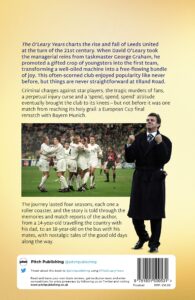 And so the reminiscences flow, from Match of the Day in the ’90s, trying to get to the Baseball Ground before kick-off, the lack of instant news throughout the period of O’Leary’s reign, the names of players that came, they saw, and conquered Elland Road – Kewell, Viduka, Matteo, Hasselbaink, Ferdinand, Bowyer, Hopkin and many, many more, the emergence of Sky, Chairman Peter Ridsdale’s ambitions which Dean suggests “had no ceiling”, a UEFA Cup run, chasing a Champion’s League spot, a Champion’s League semi-final, mistimed Inter Toto application, how the cheekiness of a father can get you an away ticket or two, even from the boss, beating Besiktas 6-0, the influence of the Geezer’s Guide to Football, O’Leary’s nose job and the eventual disillusionment with the team as O’Leary crashed and the team burned in season 2001/02. He then proceeds a much smaller chapter to end the tale of the club as the crash was followed by the abyss.
And so the reminiscences flow, from Match of the Day in the ’90s, trying to get to the Baseball Ground before kick-off, the lack of instant news throughout the period of O’Leary’s reign, the names of players that came, they saw, and conquered Elland Road – Kewell, Viduka, Matteo, Hasselbaink, Ferdinand, Bowyer, Hopkin and many, many more, the emergence of Sky, Chairman Peter Ridsdale’s ambitions which Dean suggests “had no ceiling”, a UEFA Cup run, chasing a Champion’s League spot, a Champion’s League semi-final, mistimed Inter Toto application, how the cheekiness of a father can get you an away ticket or two, even from the boss, beating Besiktas 6-0, the influence of the Geezer’s Guide to Football, O’Leary’s nose job and the eventual disillusionment with the team as O’Leary crashed and the team burned in season 2001/02. He then proceeds a much smaller chapter to end the tale of the club as the crash was followed by the abyss.
Dean does not miss the negatives. The effects of the death of fans in Turkey* should never be forgotten. The way that some football clubs had fans who tried to take advantage of this event, goading Leeds fans by chanting at them in glee at the deaths of these fans is a stain against which we should all protest. The arrests and trials of Leeds players over a fight on a night out is covered but this is not a book with insight in the dressing room. The effect of one player giving evidence against another is explained and expressed from the distance afforded by a fan’s love of his club. It is not a fist and tell account. How that ended up being a significant factor in the club failing to make it to the elite in Europe is however more than somewhat mentioned.
Finally, the nature of O’Leary’s own literary attempts is seen as a great mistake as O’Leary’s relationships with everyone seemed to dive. The book he had published, covering his Leeds time, is not a precursor to Sky style documentaries following Guardiola, Arteta, Sunderland and the like. It was an odd thing to do, especially as he was still at Leeds. Its oddness is highlighted as the money spent on players begins to unravel. The quality of the squad begins to suffer, and the writing begins to be drafted onto an Elland Road wall.
Dean’s structure also tends to dwell on the setup, so the demise has less attention and focus. For an observer this is where you want to know more but for the fan that is the tragedy. The dropping interest, and the sparsity of detail mirrors the disillusionment felt by Dean towards the end. It is understandable and, again, as a testimony of a witness to the emotional effect of the experience this is a very good one. As a history of the club, it still adds significantly. The insight of a fan is equally important, if not more so, over a given time, to that of any player. Dean has given us a significant contribution to understanding why money in football should be cautiously welcomed. This is the story of how we ended up with a team top of the Premier League at the dawn of a new century and then out in a wilderness some twenty years later awaiting an Argentinian messiah and it is fascinating.
There were a couple of moments which served, for me, as indications of the thrust of the reasons as to why this tale needed to be told. Firstly, as dean writes, “… what an extraordinary job our beloved manager had done… In his first two seasons in management, he had overcome the champions of Serbia, Russia, Belgium, Italy and Spain and got the better of legendary managers Alberto Zaccheroni, Sven-Goran Erikson and Fabio Capello.” And he did.
In the Leeds AGM of 2001, Peter Ridsdale, as reported by Dean, told fans, “I can assure everyone – shareholders and supporters alike – that your board are managing the club for sustained success, and that the club’s long term financial position is healthy.” It was not.
This is a supporter’s tale of how the Wilkinson master plan in draft never made it, and how fans endure much better.
*Christopher Loftus and Kevin Speight were brutally murdered the night before the UEFA Cup semi-final second leg against Galatasaray in Turkey.
Donald C Stewart
(Publisher: Pitch Publishing Ltd. January 2022. Hardcover: 256 pages)
Buy here:David O’Leary
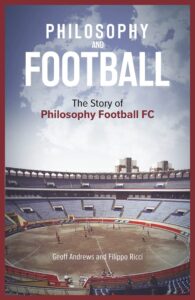 Philosophy and Football: The Story of Philosophy FC is the extraordinary account of how a team of friends kicking a ball about in Regent’s Park was transformed by European travel in the shadow of Brexit.
Philosophy and Football: The Story of Philosophy FC is the extraordinary account of how a team of friends kicking a ball about in Regent’s Park was transformed by European travel in the shadow of Brexit. Feeling Leeds gazes into the curious world of the dislocated supporter, the football fan not born and bred in the shadow of their club’s ground.
Feeling Leeds gazes into the curious world of the dislocated supporter, the football fan not born and bred in the shadow of their club’s ground. With the world turning rightwards and democracy looking at its most precarious since the 1930s, the emergence of a global network of left-wing, anti-fascist and anti-racist football fans has been one of the few shining lights in dark times.
With the world turning rightwards and democracy looking at its most precarious since the 1930s, the emergence of a global network of left-wing, anti-fascist and anti-racist football fans has been one of the few shining lights in dark times. Glory and Despair is a pictorial celebration of the World Cup that takes us on a spellbinding journey, from the inaugural tournament in 1930 to the present day.
Glory and Despair is a pictorial celebration of the World Cup that takes us on a spellbinding journey, from the inaugural tournament in 1930 to the present day.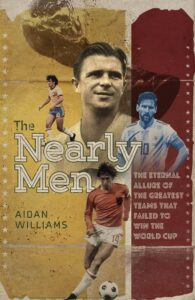 The Nearly Men tells the fascinating stories of some of the most revered international football teams of all time.
The Nearly Men tells the fascinating stories of some of the most revered international football teams of all time. Leeds United broke my heart.
Leeds United broke my heart. And so the reminiscences flow, from Match of the Day in the ’90s, trying to get to the Baseball Ground before kick-off, the lack of instant news throughout the period of O’Leary’s reign, the names of players that came, they saw, and conquered Elland Road – Kewell, Viduka, Matteo, Hasselbaink, Ferdinand, Bowyer, Hopkin and many, many more, the emergence of Sky, Chairman Peter Ridsdale’s ambitions which Dean suggests “had no ceiling”, a UEFA Cup run, chasing a Champion’s League spot, a Champion’s League semi-final, mistimed Inter Toto application, how the cheekiness of a father can get you an away ticket or two, even from the boss, beating Besiktas 6-0, the influence of the Geezer’s Guide to Football, O’Leary’s nose job and the eventual disillusionment with the team as O’Leary crashed and the team burned in season 2001/02. He then proceeds a much smaller chapter to end the tale of the club as the crash was followed by the abyss.
And so the reminiscences flow, from Match of the Day in the ’90s, trying to get to the Baseball Ground before kick-off, the lack of instant news throughout the period of O’Leary’s reign, the names of players that came, they saw, and conquered Elland Road – Kewell, Viduka, Matteo, Hasselbaink, Ferdinand, Bowyer, Hopkin and many, many more, the emergence of Sky, Chairman Peter Ridsdale’s ambitions which Dean suggests “had no ceiling”, a UEFA Cup run, chasing a Champion’s League spot, a Champion’s League semi-final, mistimed Inter Toto application, how the cheekiness of a father can get you an away ticket or two, even from the boss, beating Besiktas 6-0, the influence of the Geezer’s Guide to Football, O’Leary’s nose job and the eventual disillusionment with the team as O’Leary crashed and the team burned in season 2001/02. He then proceeds a much smaller chapter to end the tale of the club as the crash was followed by the abyss. The history of the fierce football rivalry between England and Germany is encapsulated in a single moment – Geoff Hurst’s extra-time shot off the crossbar in the 1966 FIFA World Cup Final and the decision of an infamous Russian linesman to award a goal.
The history of the fierce football rivalry between England and Germany is encapsulated in a single moment – Geoff Hurst’s extra-time shot off the crossbar in the 1966 FIFA World Cup Final and the decision of an infamous Russian linesman to award a goal. This is the story of the most controversial football World Cup of all time.
This is the story of the most controversial football World Cup of all time.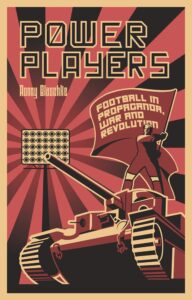 Football is increasingly becoming an instrument of political power.
Football is increasingly becoming an instrument of political power.
